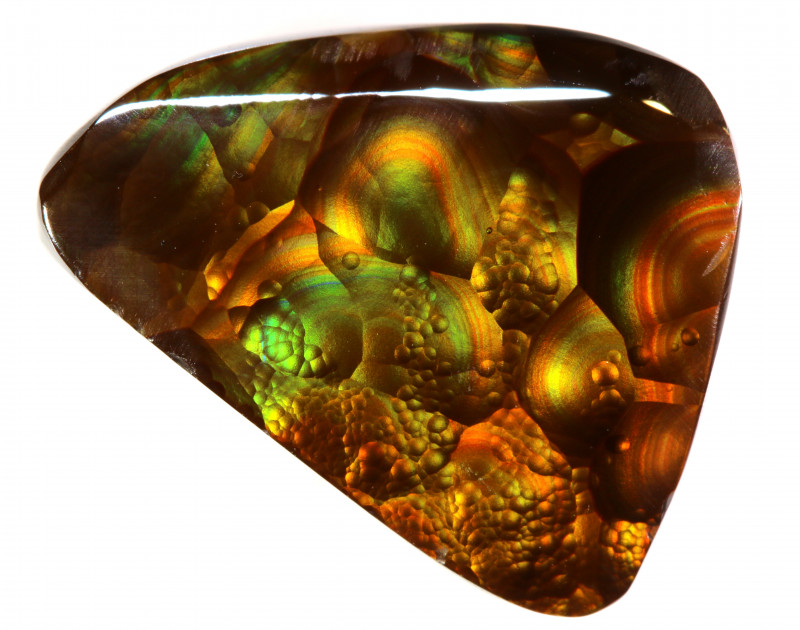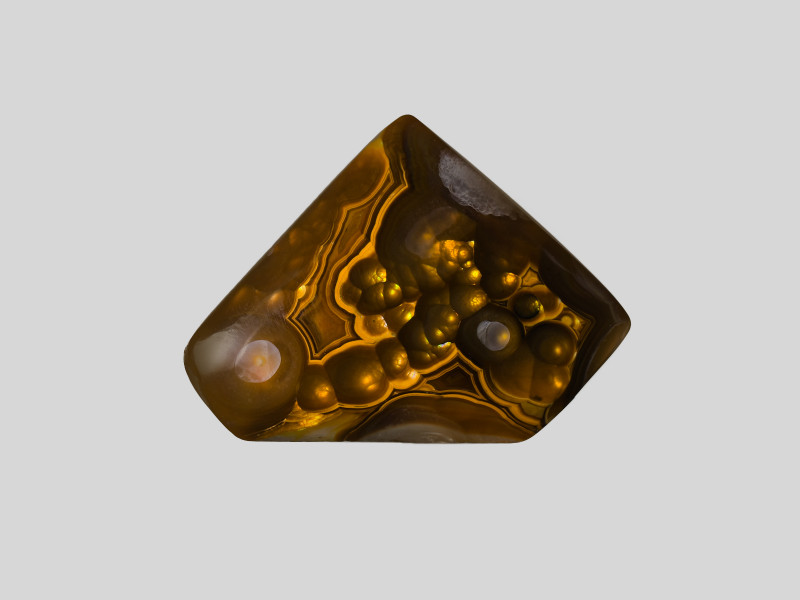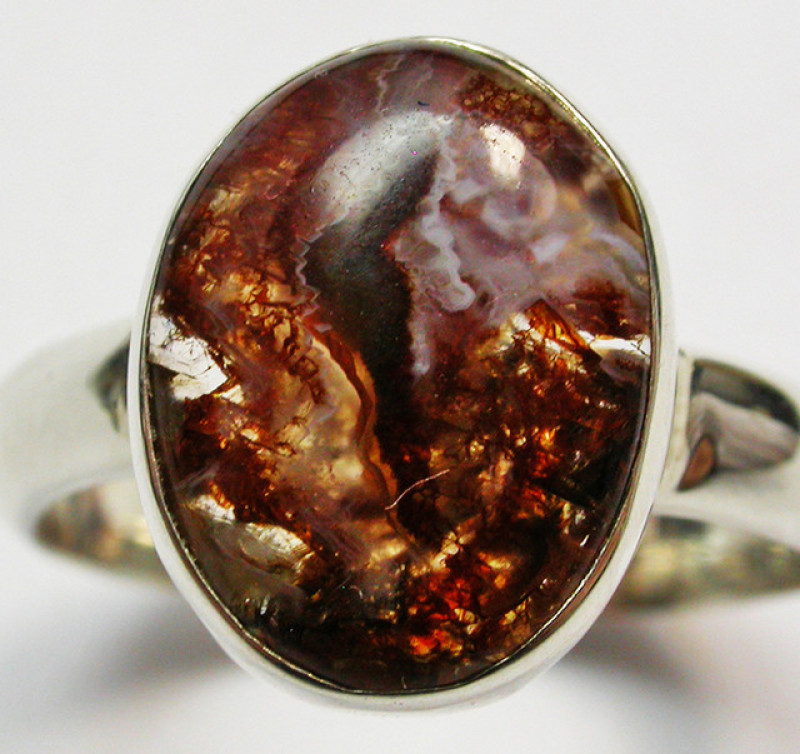
Fire Agate Gemstone: Properties, Meanings, Uses & Powers
 Fire agate gemstones are unique agate varieties with colors and iridescence resembling flickering flames. The stone is set apart from other agates in its unique layered structure, rainbow of colors, and iridescence. Plus, no fire agate is identical to another.
Fire agate gemstones are unique agate varieties with colors and iridescence resembling flickering flames. The stone is set apart from other agates in its unique layered structure, rainbow of colors, and iridescence. Plus, no fire agate is identical to another.
Agate stones are translucent, color-banded types of chalcedony (or microcrystalline quartz). Though most have layered structures and multiple colors, they lack fire agate’s orderly layers and iridescence.
Curious for more? If so, read on to discover all about fire agate gemstone traits, prices, healing properties, and more!

About Fire Agate Stone
The semi-precious gemstone fire agate was once called “cinnamon opal” or “opalescent agate” for its resemblance to precious opal. Some consider the gem the unofficial state mineral of Arizona, USA.
We should note that the “fire” referred to in fire agate isn’t the “fire” associated with gemstone dispersion.
As an agate, this stone is a traditional 14th wedding anniversary gem and zodiac stone for Gemini. It’s also a traditional May birthstone and a mystical birthstone for September!

Fire Agate Specifications & Characteristics
Fire agate is a layered stone composed of chalcedony and the iron oxide minerals goethite, limonite, or both. The thin layers of chalcedony and iron oxides are typically encompassed in a clear chalcedony layer.
This gem’s iridescence comes from the Schiller effect, where the different layers cause light interference. Interference is when thin, organized sheets make rays of light interfere with each other, causing them to separate into numerous colors.
You’ll see a similar effect of light interference from oil on water or in opals. In fact, like opals, fire agate has some portions that seem in-focus and some that seem hazy, creating a “depth of field” effect.
Here are the remaining fire agate properties:
Mohs hardness: 6-7
Color: Base - golden-brown to reddish-brown; Flashes - usually orange, green, red, yellow; Rarely violet or blue
Crystal structure: Hexagonal
Luster: Waxy, dull, or vitreous (glass-like)
Transparency: Semi-transparent to translucent
Refractive index: 1.53-1.55
Density: 2.59-2.67
Cleavage: None
Fracture: Uneven, splintery, conchoidal (wiki)
Streak: White
Luminescence: Sometimes fluorescent green in SW-UV

Types of Fire Agate
The only fire agate variety named for its natural appearance is peacock fire agate.
Some define these stones as being specifically bright peacock green, blue, and yellow. However, others classify them as any fire agate displaying three or more colors from different groups; in other words, a red (including orange or yellow), a green, and a blue (including purple or violet).
Another less technical variety is crackled fire agate, the trade name for fire agates heated to give their surface a white “crackle” look.
Lastly, we have source-based fire agate types. The locales to find fire agate are limited to mostly Mexico and Arizona.
The stone overall is rare, but Mexican fire agates are slightly more abundant and somewhat lower quality. However, fire agates from San Luis Potosi are special in displaying a golden iridescence. Arizona fire agate stones, particularly from Deer Creek, are highly sought-after by collectors.

Fire Agate Meaning & History
The fire agate crystal represents expression, rejuvenation, and balance. One example of that balance is the stone’s symbolism in both contentment and courage, encouraging its wearer to bravely pursue their purpose while grounding them to their true values.
Some spiritual nicknames for fire agate include “Stone of Eternal Youth,” “Stone of Protection,” and “Stone of Creativity.” Many energy healers laud the crystal as a powerful tool for spiritual awakening.
Agates usually represent the earth element, but fire agate represents both earth and fire. As such, some people use the gem during rituals to call upon fire deities.
History
You already know why “fire” is in the name, but what about “agate”?
Between 300-400 BC, ancient Greek polymath Theophrastus made the first recorded agate discovery near Sicily’s Achates River. He named it akhatēs, which became “agate” in French around 1560 AD.
Agate’s fame spans centuries, adorning folks since at least 3,000 BC. Fire agate, while geologically just as old, is a more modern find.
Who first discovered fire agate isn’t verified, but one California-based lapidarist (gem cutter) is the self-proclaimed finder. Warren Jones claimed in a 1977 article that he discovered it first in 1939 in Arizona, USA. Jones also stated he discovered Mexican fire agate in 1961 in San Luis Potosi.
The name “fire agate” appears before Jones’s alleged find, though. One example is a 1924 edition of The Jewelers’ Circular, where an ad for Patrician Dinner Rings lists gem options as “baroque pearls, abalone shell, fire agate, and similar popular gems.”
Over the past 60 years or so, lapidarists have gradually learned how to work with this type of agate. After trying to create calibrated fire agates and turning out consistently dull gems, those in the gem trade eventually learned cutting the gem took great expertise, skill, and practice.
Shifting gears, what is fire agate good for in crystal healing?

Fire Agate Healing Properties
All crystals are endowed with powers to make them healing stones. Predominantly red fire agates join other red gemstones in promoting passion and positivity.
Meanwhile, the rare blue fire agate shimmers you might see reflect the calming and wisdom-granting benefits of other blue crystals.
Read on for fire agate’s physical, emotional, and chakra healing benefits!
Physical Healing
Many purported fire agate benefits tie to heat: lowering a fever, reducing hot flashes, and boosting blood circulation. Crystal healers also use the crystal for increasing energy levels, improving libido, and treating digestion issues. Additionally, wearing a fire agate necklace is said to strengthen your heart.
Emotional Healing
Many people tout fire agate as a protective talisman to ward off negativity or toxic energies. It’s also believed to boost confidence, balance emotions, and encourage creativity! Overall, many who wear the gem feel their passion and enthusiasm for life ignited.
Chakra Healing
Energy healers use chakra crystals to open a specific energy center (chakra) in your body, restoring it to get rid of negative blockage symptoms. Fire agate chakra stones are best for the root (or base) chakra.
The root chakra at the base of your spine governs fundamental needs like safety and belonging. If you’re feeling listless, paranoid, or insecure, your root chakra could be blocked. Fire agate can open it, allowing you to feel grounded and connected to your purpose.

Fire Agate Gemstone Properties
Fire agate’s value comes from its color, cut, and size, along with the level of craftsmanship evident in the final gem.
Color
The internal base color is usually brown or red, caused by the iron oxide inclusions. But the iridescent hues vary. Top layers commonly display warm orange, yellow, or red hues. Then, you’ll often see green or purple.
Orange is most common, while blue and violet are the rarest, making the latter more valuable. Peacock fire agate colors are also highly valued.
Distinct color patterns may also increase value, such as swirls, pinpoints, eyes, or specks.
Cut
Cutting fire agate takes incredible expertise, patience, and skill. Typically, the raw fire agate shape determines the ultimate cut, though properly displaying the full iridescence while not cutting too deep takes lots of practice.
Lapidarists often opt for freeform fire agate cabochons or slabs. Fire agate beads are also common for jewelry, while carvings make exquisite decor. Some jewelers offer custom cuts, and these can fetch high prices.
Size
As a rare gem, fire agates in larger sizes carry higher value. However, like the cut, the size of each fire agate is more dependent on the rough than the lapidarist.
Speaking of, how does fire agate rough form in the first place?

Fire Agate Formation & Sources
Fire agates started forming 24-36 million years ago during the Tertiary Period. Those days, some areas of North America had intense volcanic activity.
The volcanic activity meant hot water filled with iron oxides (limonite and/or goethite) and colloidal (spherical, amorphous) silica flowed down under Earth’s surface. The solution settled into rock pockets or cracks to cool.
As the water slowly evaporated, chalcedony bubble-shapes (or botryoidal hemispheres) started forming. The silica and iron oxide teamed up to deposit stacks of thin layers on top of the “bubbles.”
Once iron oxide ran out, the silica kept working, creating a clear chalcedony around the previous layers.
Wondering where to find fire agate? That’s next!
Mining Locations
So far, fire agate has only been found in two countries: Mexico and the USA. The area is called the Sonoran Desert region; specifically, southwestern USA, northern Mexico, and central Mexico. Currently, Arizona (USA) is the top producer.
Other abundant (specific) locales include:
Aguascalientes, Mexico
California, USA
Chihuahua, Mexico
Colorado River, USA
New Mexico, USA
San Luis Potosi, Mexico (fire agate with golden fire)
Given the limited sources, how much is fire agate worth?

Fire Agate Price & Value
Most fire agate stones are $2-$40 per carat, but certain traits can mean higher prices. Large stones with multi-colored iridescence, good shine, and a master cut can be $100- $200 per carat.
All other fire agate cabochons range from $5-$30 per carat at wholesale, with stones displaying more iridescent colors on the higher end. Wholesale fire agate rough is usually $0.14-$3 per carat.
Fire Agate Care and Maintenance
Being in the quartz family and lacking cleavage, fire agate is pretty tough. Still, it needs gentle gemstone care to avoid breaks, discoloration, and scratches.
Clean fire agate by gently wiping it with a soft cloth dipped in a mixture of warm water and mild soap. Then, rinse any soap residue from the stone and dry it with a microfiber cloth. Keep the stone away from extreme heat and harsh chemicals.

Fired Up for Fire Agate?
When jewelers craft fire agate jewelry, they have to recognize the stone’s hidden potential and carve it out. Similarly, this flaming gem can inspire you to find your own inner light and use that power to set the world alight!
Searching for a gem to ignite your spirit? Buy fire agate gemstones today!
Search the Gemstone Encyclopedia
Related Auctions
Related Articles
Originally the Birthstones or gemstones were associated with a zodiac sign or the month of a individuals birth. Find out what your stone is and view the stones we have for sale
8th Feb 2021
There are dozens of quartz and chalcedony gems with various colors and patterns. Learn all about quartz properties and every type of quartz, from amethyst and agate to plasma and phantom quartz!
15th Oct 2020
Hackmanite is a pink to violet sodalite gem known for its unique color-change and luminescence. Learn why hackmanite is special, from its rare qualities to the types of hackmanite jewelry available.
28th Mar 2018
Latest Articles
Yugawaralite is a rare colorless, white, or pinkish zeolite crystal named for its discovery in Yugawara, Japan. Here we uncover the multifaceted history, properties, prices, and uses of yugawaralite.
24th Mar 2025
Simpsonite is a lesser-known mineral known on the gem market for its durability, yellow-orange color, and rarity. Discover all the properties, uses, prices, and history of simpsonite.
3rd Mar 2025
Kurnakovite is a colorless crystal related to inderite and rarely faceted but known among collectors. Explore the mineral traits, history, prices, and more in this kurnakovite guide.
17th Feb 2025
Article Categories
How To's is where you will find helpful articles from gem Rock Auctions on how to cut gemstones, select gemstones and buy gemstones.
9 Articles





